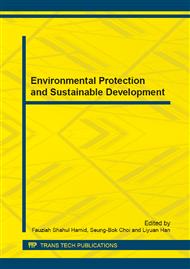p.1826
p.1831
p.1840
p.1844
p.1850
p.1853
p.1858
p.1871
p.1879
Research of Knowledge Transfer Mechanisms and Environmental Uncertaint towards Renewable Energy in Thailand
Abstract:
This explanatory research explores the relationship among environmental uncertainty, knowledge transfers mechanisms, dynamic capability, and competitive advantage. A total of 235 project managers employed by energy companies in Thailand were invited to participate in the study. The findings indicated that (a) through knowledge transfer mechanisms, project teams could develop an energy enterprises core competence and build its competitive advantage, (b) the relationship between environmental uncertainty and knowledge transfer mechanisms is negative, and (c) dynamic capability and competitive advantage have a positive relationship. The limitations of the study regarding generalization, and recommendations for future research to replicate the study in other countries, are also included.
Info:
Periodical:
Pages:
1850-1852
Citation:
Online since:
February 2014
Price:
Сopyright:
© 2014 Trans Tech Publications Ltd. All Rights Reserved
Share:
Citation:


